#tichborne case
Text
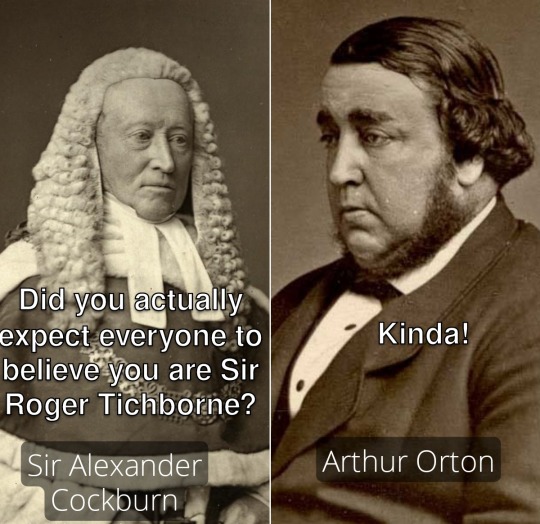
The Tichborne Case
3 notes
·
View notes
Text
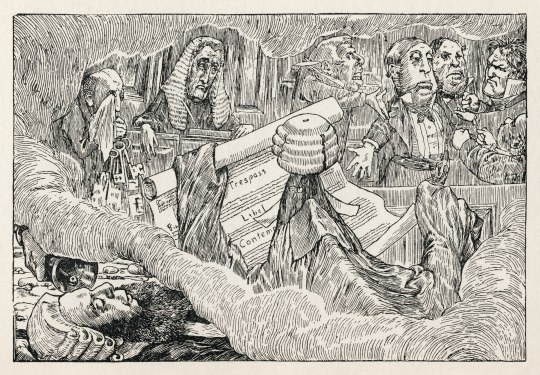
The Barrister's Dream from Fit the Sixth of The Hunting of the Snark
#carrolliana#it fairly lost heart and outgrabe in despair#thinking of the tichborne case reminded me... time for my semiannual snark reread
0 notes
Text
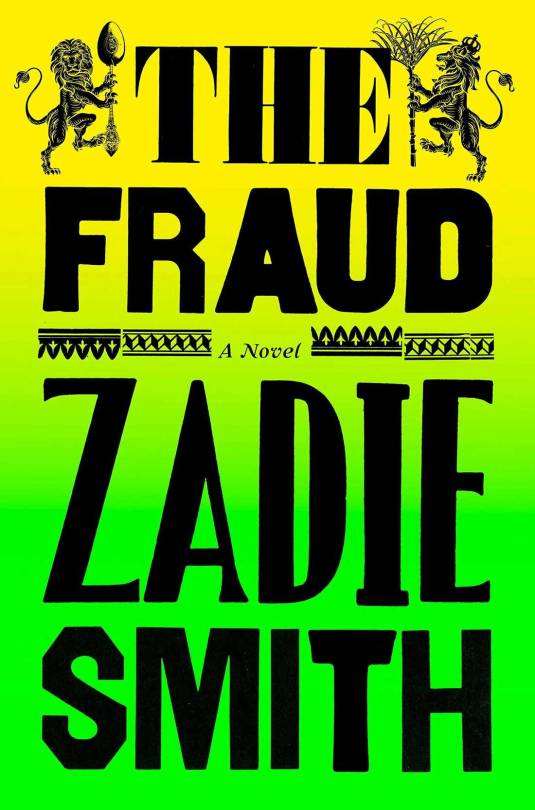
It is 1873. Mrs. Eliza Touchet is the Scottish housekeeper—and cousin by marriage—of a once-famous novelist, now in decline, William Ainsworth, with whom she has lived for thirty years.
Mrs. Touchet is a woman of many interests: literature, justice, abolitionism, class, her cousin, his wives, this life and the next. But she is also sceptical. She suspects her cousin of having no talent; his successful friend, Mr. Charles Dickens, of being a bully and a moralist; and England of being a land of facades, in which nothing is quite what it seems.
Andrew Bogle, meanwhile, grew up enslaved on the Hope Plantation, Jamaica. He knows every lump of sugar comes at a human cost. That the rich deceive the poor. And that people are more easily manipulated than they realize. When Bogle finds himself in London, star witness in a celebrated case of imposture, he knows his future depends on telling the right story.
The “Tichborne Trial”—wherein a lower-class butcher from Australia claimed he was in fact the rightful heir of a sizable estate and title—captivates Mrs. Touchet and all of England. Is Sir Roger Tichborne really who he says he is? Or is he a fraud? Mrs. Touchet is a woman of the world. Mr. Bogle is no fool. But in a world of hypocrisy and self-deception, deciding what is real proves a complicated task. . . .
Based on real historical events, The Fraud is a dazzling novel about truth and fiction, Jamaica and Britain, fraudulence and authenticity and the mystery of “other people.”
5 notes
·
View notes
Text
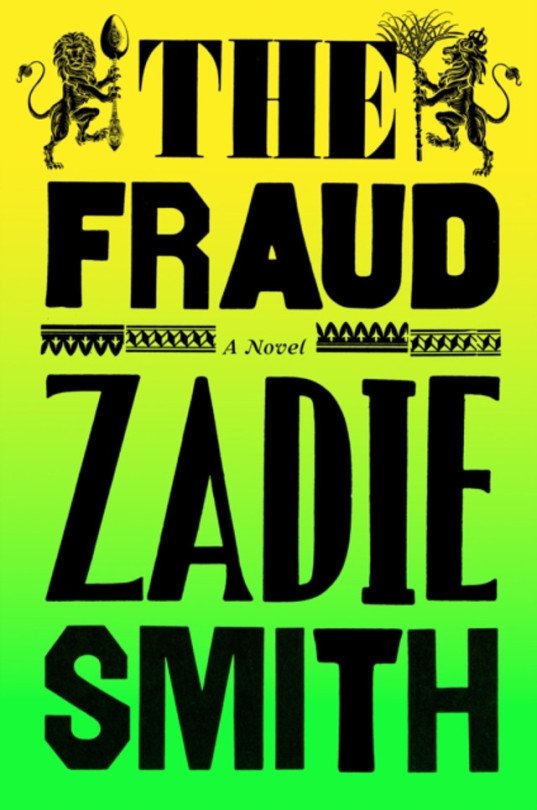
It is 1873. Mrs Eliza Touchet is the Scottish housekeeper - and cousin by marriage - of a once famous novelist, now in decline, William Ainsworth, with whom she has lived for thirty years.
Mrs Touchet is a woman of many interests: literature, justice, abolitionism, class, her cousin, his wives, this life and the next. But she is also sceptical. She suspects her cousin of having no talent; his successful friend, Mr Charles Dickens, of being a bully and a moralist; and England of being a land of facades, in which nothing is quite what it seems.
Andrew Bogle meanwhile grew up enslaved on the Hope Plantation, Jamaica. He knows every lump of sugar comes at a human cost. That the rich deceive the poor. And that people are more easily manipulated than they realise. When Bogle finds himself in London, star witness in a celebrated case of imposture, he knows his future depends on telling the right story.
The 'Tichborne Trial' captivates Mrs Touchet and all of England. Is Sir Roger Tichborne really who he says he is? Or is he a fraud? Mrs Touchet is a woman of the world. Mr Bogle is no fool. But in a world of hypocrisy and self-deception, deciding what is real proves a complicated task...
Based on real historical events, The Fraud is a dazzling novel about truth and fiction, Jamaica and Britain, fraudulence and authenticity, and the mystery of 'other people.'
Daily inspiration. Discover more photos at Just for Books…?
2 notes
·
View notes
Text
This real life case seems to have some parallels with Downton's Fake Patrick situation.
Listen to the episode here
4 notes
·
View notes
Text
The Rest Is History podcast: Victorian Britain’s Maddest Mystery . Roger Tichborne, a 25-year-old aristocrat and heir to a fortune, died in a shipwreck in 1854. “His mother, certain of her son’s survival, advertised extensively with a tantalising reward for her son’s return. Twenty years later a rough, corpulent butcher from Australia named Arthur Orton arrived in Europe and declared himself to be the long lost heir. The trial that ensued captivated the public…. " Writer Zadie Smith discusses the case, which is the basis of her new historical novel, “The Fraud.”
1 note
·
View note
Text
by Adam Kirsch
In Elif Batuman’s 2022 novel Either/Or, the narrator, Selin, goes to her college library to look for Prozac Nation, the 1994 memoir by Elizabeth Wurtzel. Both of Harvard’s copies are checked out, so instead she reads reviews of the book, including Michiko Kakutani’s in the New York Times, which Batuman quotes:
“Ms. Wurtzel’s self-important whining” made Ms. Kakutani “want to shake the author, and remind her that there are far worse fates than growing up during the 70’s in New York and going to Harvard.”
It’s a typically canny moment in a novel that strives to seem artless. Batuman clearly recognizes that every criticism of Wurtzel’s bestseller—narcissism, privilege, triviality—could be applied to Either/Or and its predecessor, The Idiot, right down to the authors’ shared Harvard pedigree. Yet her protagonist resists the identification, in large part because she doesn’t see herself as Wurtzel’s contemporary. Wurtzel was born in 1967 and Batuman in 1977. This makes both of them members of Generation X, which includes those born between 1965 and 1980. But Selin insists that the ten-year gap matters: “Generation X: that was the people who were going around being alternative when I was in middle school.”
I was born in 1976, and the closer we products of the Seventies get to fifty, the clearer it becomes to me that Batuman is right about the divide—especially when it comes to literature. In pop culture, the Gen X canon had been firmly established by the mid-Nineties: Nirvana’s Nevermind appeared in 1991, the movie Reality Bites in 1994, Alanis Morissette’s Jagged Little Pill in 1995. Douglas Coupland’s book Generation X, which popularized the term, was published in 1991. And the novel that defined the literary generation, Infinite Jest, was published in 1996, when David Foster Wallace was about to turn thirty-four—technically making him a baby boomer.
Batuman was a college sophomore in 1996, presumably experiencing many of the things that happen to Selin in Either/Or. But by the time she began to fictionalize those events twenty years later, she joined a group of writers who defined themselves, ethically and aesthetically, in opposition to the older representatives of Generation X. For all their literary and biographical differences, writers like Nicole Krauss, Teju Cole, Sheila Heti, Ben Lerner, and Tao Lin share some basic assumptions and aversions—including a deep skepticism toward anyone who claims to speak for a generation, or for any entity larger than the self.
That skepticism is apparent in the title of Zadie Smith’s new novel, The Fraud. Smith’s precocious success—her first book, White Teeth, was published in 2000, when she was twenty-four—can make it easy to think of her as a contemporary of Wallace and Wurtzel. In fact she was born in 1975, two years before Batuman, and her sensibility as a writer is connected to her generational predicament.
Smith’s latest book is, most obviously, a response to the paradoxical populism of the late 2010s, in which the grievances of “ordinary people” found champions in elite figures such as Donald Trump and Boris Johnson. Rather than write about current events, however, Smith has elected to refract them into a story about the Tichborne case, a now-forgotten episode that convulsed Victorian England in the 1870s.
In particular, Smith is interested in how the case challenges the views of her protagonist, Eliza Touchet. Eliza is a woman with the sharp judgment and keen perceptions of a novelist, though her era has deprived her of the opportunity to exercise those gifts. Her surname—pronounced in the French style, touché—evokes her taste for intellectual combat. But she has spent her life in a supportive role, serving variously as housekeeper and bedmate to her cousin William Harrison Ainsworth, a man of letters who churns out mediocre historical romances by the yard. (Like most of the novel’s characters, Ainsworth and Touchet are based on real-life historical figures.)
Now middle-aged, Eliza finds herself drawn into public life by the Tichborne saga, which has divided the nation and her household as bitterly as any of today’s political controversies. Like all good celebrity trials, the case had many supporting players and intricate subplots, but at heart it was a question of identity: Was the man known as “the Claimant” really Roger Tichborne, an aristocrat believed to have died in a shipwreck some fifteen years earlier? Or was he Arthur Orton, a cockney butcher who had emigrated to Australia, caught wind of the reward on offer from Roger’s grief-stricken mother, and seized the chance of a lifetime? In the end, a jury decided that he was Orton, and instead of inheriting a country estate he wound up in a jail cell. What fascinates Smith, though, is the way the Tichborne case became a political cause, energizing a movement that took justice for “Sir Roger” to be in some way related to justice for the common man.
Eliza is a right-minded progressive who was active in the abolitionist movement in the 1830s. Proud of her judgment, she sees many problems with the Claimant’s story and finds it incredible that anyone could believe him. To her dismay, however, she lives with someone who does. William’s new wife, Sarah, formerly his servant, sees the Claimant as a victim of the same establishment that lorded over her own working-class family. The more she is informed of the problems with the Claimant’s argument, the more obdurate she becomes: “HE AIN’T CALLED ARTHUR ORTON IS HE,” she yells, “THEM WHO SAY HE’S ORTON ARE LYING.”
What Smith is dramatizing, of course, is the experience of so many liberal intellectuals over the past decade who had believed themselves to be on the side of “the people” only to find that, whether the issue was Brexit or Trump or COVID-19 protocols, the people were unwilling to heed their guidance, and in fact loathed them for it. It is in order to get to the bottom of this phenomenon that Eliza keeps attending the Tichborne trial, in much the same spirit that many liberal journalists reported from Trump rallies. Things get even more complicated when she befriends a witness for the defense, Mr. Bogle, who is among the Claimant’s main supporters even though he began his life as a slave on a Jamaica plantation managed by Edward Tichborne, the Claimant’s supposed father.
Though much of the novel deals with the case and the history of slavery in Britain’s Caribbean colonies, it is first and foremost the story of Eliza Touchet, and how her exposure to the trial alters her sense of the world and of herself. “The purpose of life was to keep one’s mind open,” she reflects, and it is this ability to see things from another perspective that makes her a novelist manqué.
Open-mindedness, even to the point of moral ambiguity, is one of the chief values Smith shares with her literary contemporaries. These writers grew up during a period of heightened tensions between the United States and the Soviet Union, then took their first steps toward adult consciousness just as the Cold War concluded. They came of age in the brief period that Francis Fukuyama called “the end of history.”
Fukuyama’s description, famously premature though it was, still captures something crucial about the context in which the children of the Seventies began to think and write. While the fall of Communism in Eastern Europe is sometimes remembered as the “Revolutions of 1989,” the mood it created in the West was hardly revolutionary. After 1989, there was little of the “bliss was it in that dawn to be alive” sentiment that had animated Wordsworth during the French Revolution. Instead, the ambient sense that history was moving steadily in the right direction encouraged writers to see politics as less urgent, and less morally serious, than inward experience.
In the fiction that defined the pre-9/11 era, political phenomena tended to assume cartoon form. Wallace’s Infinite Jest features an organization of Quebecois separatists called Les Assassins des Fauteuils Rollents—that is, the Wheelchair Assassins. In Smith’s White Teeth, one of the main characters joins a militant group named KEVIN, for Keepers of the Eternal and Victorious Islamic Nation. The attacks on the Twin Towers and the war on terror would put an end to jokes like these, but for a decade or so it was possible to see ideological extremism as a relic fit for spoofing—as with KGB Bar, a popular New York literary venue that opened in 1993.
For the young writers of that era, the most important battles were not being fought abroad but at home, and within themselves. Their enemies were the forces of cynicism and indifference that Wallace depicted in Infinite Jest, set in a near-future America stupefied by consumerism, mass entertainment, and addictive substances. The great balancing act of Wallace’s fiction was to truthfully represent this stupor while holding open the possibility that one could recover from it, the way the residents of the novel’s Ennet House manage to recover from their addictions. This dialectical mission is responsible for the spiraling self-consciousness that is the most distinctive (and, to some readers, the most annoying) aspect of his writing.
Dave Eggers set himself an analogous challenge in his 2000 memoir A Heartbreaking Work of Staggering Genius. Writing about a childhood tragedy—the nearly simultaneous deaths from cancer of his mother and father, which left the young Eggers with custody of his eight-year-old brother—he aimed to do full justice to his despair while still insisting on the validity of hope. “This did not happen to us for naught, I can assure you,” he writes,
there is no logic to that, there is logic only in assuming that we suffered for a reason. Just give us our due. I am bursting with the hopes of a generation, their hopes surge through me, threaten to burst my hardened heart!
By the end of the millennium, this was the familiar voice of Generation X. Loquacious and self-involved, its ironic grandiosity barely concealed a sincere grandiosity about its moral mission, which was to defeat despair and foster genuine human connection. Jonathan Franzen, Wallace’s realist rival, titled a book of essays How to Be Alone, and for these writers, loneliness was the great problem that literature was created to solve. “If writing was the medium of communication within the community of childhood, it makes sense that when writers grow up they continue to find writing vital to their sense of connectedness,” Franzen wrote in his much-discussed essay “Perchance to Dream,” published in these pages in 1996. Eggers seems to have taken this idea literally, creating a nonprofit, 826 Valencia, that advertises writing mentorship for underserved students as a way of “building community” and rectifying inequality.
If sincerity and connection were the greatest virtues for these writers, the greatest sin was “snark.” That word gained literary currency thanks to a manifesto by Heidi Julavits in the first issue of The Believer, the magazine she co-founded in 2003 with the novelist Vendela Vida (Eggers’s wife) and the writer Ed Park. The title of the essay—“Rejoice! Believe! Be Strong and Read Hard!”—like the title of the magazine, insisted that literature was an essentially moral enterprise, a matter of goodness, courage, and love. To demur from this vision was to reveal a smallness of soul that Julavits called snark: “wit for wit’s sake—or, hostility for hostility’s sake,” a “hostile, knowing, bitter tone of contempt.” For Kafka, a book was an axe for the frozen sea within; for the older cohort of Gen X writers, it was more like a hacksaw to cut through the barred cell of cynicism.
This was the environment—quiescent in politics, self-consciously sincere in literature—in which Smith and her contemporaries came of age. Just as they started to publish their first books, however, the stopped clock of history resumed with a vengeance. It is unnecessary to list the series of political and geopolitical shocks that have occurred since 2000. For the millennial generation, adulthood has been defined by apocalyptic fears, political frenzy, and glimpses of utopia, whether in Chicago’s Grant Park on election night 2008 or in New York’s Zuccotti Park during Occupy Wall Street in 2011.
The children of the Seventies tend to feel out of place in this new world. It’s not that they naïvely looked forward to a future of peace and harmony and are offended to find that it has not materialized. It is rather that their literary gaze was fixed within at an early age, and they continue to believe that the most authentic way to write about history is as the deteriorating climate through which the self moves.
The self, meanwhile, they approach with mistrust—a reaction against the heart-on-sleeve sincerity of their elders. Many of them have turned to autofiction, a genre which is often criticized as narcissistic—a way of shrinking the world to fit into the four walls of the writer’s room. In fact, it has served these writers as an antidote to the grandiosity of memoir, which tends to falsify in the direction of self-flattery—as this generation learned from the spectacular implosion of James Frey’s 2003 bestseller, A Million Little Pieces. By admitting from the outset that it is not telling the truth about the author’s life, autofiction makes it possible to emphasize the moral ambiguities that memoir has to apologize for or hide. That makes it useful for writers who are not in search of goodness, neither within themselves nor in political movements.
For Sheila Heti, this resistance to goodness takes the form of artistic introspection, which busier people tend to judge as selfish and idle. In How Should a Person Be?, from 2010, a character named Sheila has dinner with a young theater director named Ben, who has just returned with a friend from South Africa. “It was just such a crushing awakening of the colossal injustice of the way our world works economically,” he says of their trip, that he now wonders whether his work as a theater director—“a very narcissistic activity”—is morally justifiable. Yet nothing could be more narcissistic, in Heti’s telling, than such moral preening, and Sheila instinctively resists it. “They are so serious. They lectured me about my lack of morality,” she complains. She loathes the idea of having “to wear on the outside one’s curiosity, one’s pity, one’s guilt,” when art is concerned with what happens inside, which can only be observed with effort and in private. “It’s time to stop asking questions of other people,” she tells herself. “It is time to just go into a cocoon and spin your soul.”
Teju Cole’s 2011 novel Open City offers a more ambivalent version of the same idea. Julius, the narrator, can’t justify his aesthetic self-absorption on the grounds that he is an artist, as Sheila does, since he is a psychiatrist. It’s an ironic choice of profession for a man we come to know as guarded and aloof. Cole builds a portrait of Julius through his daily interactions with other people, like the taxi driver whose cab he enters gruffly. “The way you came into my car without saying hello, that was bad,” the driver rebukes him. “Hey, I’m African just like you, why you do this?” Julius apologizes for this small breach of solidarity, but insincerely: “I wasn’t sorry at all. I was in no mood for people who tried to lay claims on me.”
Indeed, for most of the novel he is alone, meditating in Sebaldian fashion on the atrocities of history as he takes long walks through Manhattan. When, during a trip to Brussels, he meets a man who wants to intervene in history—Farouq, a young Moroccan intellectual who declares that “America is a version of Al-Qaeda”—Julius is decidedly unimpressed:
There was something powerful about him, a seething intelligence, something that wanted to believe itself indomitable. But he was one of the thwarted ones. His script would stay in proportion.
Open City can’t be said to endorse Julius’s aesthetic solipsism. On the contrary, the last chapter finds him trapped on a fire escape outside Carnegie Hall in the rain, a striking symbol of a man isolated by culture. Just moments before, he had been united with the rest of the audience in Mahlerian rapture; now, he reflects, “my fellow concertgoers went about their lives oblivious to my plight,” as he tries to avoid slipping and falling to his death. The scene is Cole’s acknowledgment that aesthetic consciousness remains passive and solipsistic even when experienced in common, and that danger demands a different kind of solidarity—one that is active, ethical, even political. Yet Cole conjures Julius’s aristocratic fatalism in such intimate detail that the “Rejoice! Believe!” approach—to literature, and to life—can only appear childish.
Writers of this cohort do sometimes try to imagine a better world, but they tend to do so in terms that are metaphysical rather than political, moving at one bound from the fallen present to some kind of messianic future. In her 2022 novel Pure Colour, Heti tells the story of a woman named Mira whose grief over her father’s death prompts her to speculate about what Judaism calls the world to come. In Heti’s vision, this is not a place to which the soul repairs after death, nor is it some kind of revolutionary political arrangement; rather, it is an entirely new world that God will one day create to replace the one we live in, which she calls “the first draft of existence.”
The hardest thing to accept, for Heti’s protagonist, is that the end of our world will mean the disappearance of art. “Art would never leave us like a father dying,” Mira says. “In a way, it would always remain.” But over the course of Pure Colour, she comes to accept that even art is transitory. In a profoundly self-accusing passage, she concludes that a better world might even require the disappearance of art, since
art is preserved on hearts of ice. It is only those with icebox hearts and icebox hands who have the coldness of soul equal to the task of keeping art fresh for the centuries, preserved in the freezer of their hearts and minds.
Tao Lin’s unnerving, affectless autofiction leaves a rather different impression than Heti’s, and he has sometimes been identified as a voice from the next generation, the millennials. But his 2021 novel Leave Society shows him thinking along similar lines as the children of the Seventies. In Taipei, from 2013, Lin’s alter ego is named Paul, and he spends most of the novel joylessly eating in restaurants and taking mood-altering drugs. In Leave Society he is named Li, but he is recognizably the same person, perched on a knife-edge between extreme sensitivity and neurotic withdrawal. In the interim, he has decided that the cure for his troubles, and the world’s, lies in purging the body of the toxins that infiltrate it from every direction.
Like Heti, Lin anticipates a great erasure. All of recorded history, he writes, has been merely a “brief, fallible transition . . . from matter into the imagination.” Sometime soon we will emerge into a universe that bears no resemblance to the one we know. Writers, Lin concludes, participate in this process not by working for social change but by reforming the self. “Li disliked trying to change others,” Lin writes, and believed that “people who are concerned about evil and injustice in the world should begin the campaign against those things at their nearest source—themselves.”
One way or another, writers in this cohort all acknowledge the same injunction—even the ones who struggle against it. In his new book of poems, The Lights, Ben Lerner strives to elaborate an idea of redemption that is both private and social:
I don’t know any songs, but won’t withdraw. I am dreaming
the pathetic dream of a pathos capable of redescription,
so that corporate personhood becomes more than legal fiction.
A dream in prose of poetry, a long dream of waking.
The dream of uniting the sophistication of art with the straightforwardness of justice also animates Lerner’s fiction, where it often takes the form of rueful comedy. In 10:04, the narrator cooks dinner for an Occupy Wall Street protester, but when asked how often he has been to Zuccotti Park, he dodges the question. His activism is limited to cooking, which he pompously describes as a way of being “a producer and not a consumer alone of those substances necessary for sustenance and growth within my immediate community.” That the dream never becomes more than a dream betrays Lerner’s similarity to Lin, Heti, and Cole, who frankly acknowledge the hiatus between art and justice, though without celebrating it.
Zadie Smith has always been too deeply rooted in the social comedy of the English novel to embrace autofiction, yet she also registers this disconnect, as can be seen in the way her influences have shifted over time. When it was first published, White Teeth was compared to Infinite Jest and Don DeLillo’s Underworld as a work of what James Wood called “hysterical realism.” The book’s arch humor, proliferating plot, and penchant for exaggeration owe much to the author Wood identified as the “parent” of that genre: Charles Dickens.
When Smith says that a woman “needed no bra—she was independent, even of gravity,” she is borrowing Dickens’s technique of making characters so intensely themselves that their essence saturates everything around them—as when he writes of the nouveau riche Veneerings, in Our Mutual Friend, that “their carriage was new, their harness was new, their horses were new, their pictures were new, they themselves were new.” Dickens is a guest star in The Fraud, appearing at several of William Ainsworth’s dinner parties, and the news of his death prompts Eliza Touchet to offer an apt tribute: “She knew she lived in an age of things . . . and Charles had been the poet of things.”
But Dickens, who at another point in the novel is gently disparaged for his moralizing “sermons,” is no longer the presiding genius of Smith’s fiction. (Smith wrote in a recent essay that her first principle in taking up the historical novel was “no Dickens,” and she expressed a wry disappointment that he had forced his way into the proceedings.) Her 2005 novel, On Beauty, was a reimagining of E. M. Forster’s Howards End, and while her style has continued to evolve from book to book, Forster’s influence has been clear ever since, in everything from her preference for short chapters to her belief in “keep[ing] one’s mind open.”
Smith’s affinity for Forster owes something to their analogous historical situations. An Edwardian liberal who lived into the age of fascism and communism, Forster defended his values—“tolerance, good temper and sympathy,” as he put it in the 1939 essay “What I Believe”—with something of a guilty conscience, recognizing that the militant younger generation regarded them as “bourgeois luxuries.”
At the end of The Fraud, Eliza encounters Mr. Bogle’s son Henry, who has grown disgusted with his father’s quietism and become a political radical. He reproaches her for being more interested in understanding injustice than in doing something about it, proclaiming:
By God, don’t you see that what young men hunger for today is not “improvement” or “charity” or any of the watchwords of your Ladies’ Societies. They hunger for truth! For truth itself! For justice!
This certainty and urgency is the opposite of keeping one’s mind open, and while Mrs. Touchet—and Smith—aren’t prepared to say that it is wrong, they are certain that it’s not for them: “This essential and daily battle of life he had described was one she could no more envisage living herself than she could imagine crossing the Atlantic Ocean in a hot air balloon.”
Whether they style themselves as humanists or aesthetes, realists or visionaries, the most powerful writers who were born in the Seventies share this basic aloofness. To the next generation, the millennials, their disengagement from the collective struggle may seem reprehensible. For me, as I suspect is the case for many readers my age, it is part of what makes them such reliable guides to understanding, if not the times we live in, then at least the disjunction between the times and the self that must try to negotiate them.
0 notes
Text
by Adam Kirsch
In Elif Batuman’s 2022 novel Either/Or, the narrator, Selin, goes to her college library to look for Prozac Nation, the 1994 memoir by Elizabeth Wurtzel. Both of Harvard’s copies are checked out, so instead she reads reviews of the book, including Michiko Kakutani’s in the New York Times, which Batuman quotes:
“Ms. Wurtzel’s self-important whining” made Ms. Kakutani “want to shake the author, and remind her that there are far worse fates than growing up during the 70’s in New York and going to Harvard.”
It’s a typically canny moment in a novel that strives to seem artless. Batuman clearly recognizes that every criticism of Wurtzel’s bestseller—narcissism, privilege, triviality—could be applied to Either/Or and its predecessor, The Idiot, right down to the authors’ shared Harvard pedigree. Yet her protagonist resists the identification, in large part because she doesn’t see herself as Wurtzel’s contemporary. Wurtzel was born in 1967 and Batuman in 1977. This makes both of them members of Generation X, which includes those born between 1965 and 1980. But Selin insists that the ten-year gap matters: “Generation X: that was the people who were going around being alternative when I was in middle school.”
I was born in 1976, and the closer we products of the Seventies get to fifty, the clearer it becomes to me that Batuman is right about the divide—especially when it comes to literature. In pop culture, the Gen X canon had been firmly established by the mid-Nineties: Nirvana’s Nevermind appeared in 1991, the movie Reality Bites in 1994, Alanis Morissette’s Jagged Little Pill in 1995. Douglas Coupland’s book Generation X, which popularized the term, was published in 1991. And the novel that defined the literary generation, Infinite Jest, was published in 1996, when David Foster Wallace was about to turn thirty-four—technically making him a baby boomer.
Batuman was a college sophomore in 1996, presumably experiencing many of the things that happen to Selin in Either/Or. But by the time she began to fictionalize those events twenty years later, she joined a group of writers who defined themselves, ethically and aesthetically, in opposition to the older representatives of Generation X. For all their literary and biographical differences, writers like Nicole Krauss, Teju Cole, Sheila Heti, Ben Lerner, and Tao Lin share some basic assumptions and aversions—including a deep skepticism toward anyone who claims to speak for a generation, or for any entity larger than the self.
That skepticism is apparent in the title of Zadie Smith’s new novel, The Fraud. Smith’s precocious success—her first book, White Teeth, was published in 2000, when she was twenty-four—can make it easy to think of her as a contemporary of Wallace and Wurtzel. In fact she was born in 1975, two years before Batuman, and her sensibility as a writer is connected to her generational predicament.
Smith’s latest book is, most obviously, a response to the paradoxical populism of the late 2010s, in which the grievances of “ordinary people” found champions in elite figures such as Donald Trump and Boris Johnson. Rather than write about current events, however, Smith has elected to refract them into a story about the Tichborne case, a now-forgotten episode that convulsed Victorian England in the 1870s.
In particular, Smith is interested in how the case challenges the views of her protagonist, Eliza Touchet. Eliza is a woman with the sharp judgment and keen perceptions of a novelist, though her era has deprived her of the opportunity to exercise those gifts. Her surname—pronounced in the French style, touché—evokes her taste for intellectual combat. But she has spent her life in a supportive role, serving variously as housekeeper and bedmate to her cousin William Harrison Ainsworth, a man of letters who churns out mediocre historical romances by the yard. (Like most of the novel’s characters, Ainsworth and Touchet are based on real-life historical figures.)
Now middle-aged, Eliza finds herself drawn into public life by the Tichborne saga, which has divided the nation and her household as bitterly as any of today’s political controversies. Like all good celebrity trials, the case had many supporting players and intricate subplots, but at heart it was a question of identity: Was the man known as “the Claimant” really Roger Tichborne, an aristocrat believed to have died in a shipwreck some fifteen years earlier? Or was he Arthur Orton, a cockney butcher who had emigrated to Australia, caught wind of the reward on offer from Roger’s grief-stricken mother, and seized the chance of a lifetime? In the end, a jury decided that he was Orton, and instead of inheriting a country estate he wound up in a jail cell. What fascinates Smith, though, is the way the Tichborne case became a political cause, energizing a movement that took justice for “Sir Roger” to be in some way related to justice for the common man.
Eliza is a right-minded progressive who was active in the abolitionist movement in the 1830s. Proud of her judgment, she sees many problems with the Claimant’s story and finds it incredible that anyone could believe him. To her dismay, however, she lives with someone who does. William’s new wife, Sarah, formerly his servant, sees the Claimant as a victim of the same establishment that lorded over her own working-class family. The more she is informed of the problems with the Claimant’s argument, the more obdurate she becomes: “HE AIN’T CALLED ARTHUR ORTON IS HE,” she yells, “THEM WHO SAY HE’S ORTON ARE LYING.”
What Smith is dramatizing, of course, is the experience of so many liberal intellectuals over the past decade who had believed themselves to be on the side of “the people” only to find that, whether the issue was Brexit or Trump or COVID-19 protocols, the people were unwilling to heed their guidance, and in fact loathed them for it. It is in order to get to the bottom of this phenomenon that Eliza keeps attending the Tichborne trial, in much the same spirit that many liberal journalists reported from Trump rallies. Things get even more complicated when she befriends a witness for the defense, Mr. Bogle, who is among the Claimant’s main supporters even though he began his life as a slave on a Jamaica plantation managed by Edward Tichborne, the Claimant’s supposed father.
Though much of the novel deals with the case and the history of slavery in Britain’s Caribbean colonies, it is first and foremost the story of Eliza Touchet, and how her exposure to the trial alters her sense of the world and of herself. “The purpose of life was to keep one’s mind open,” she reflects, and it is this ability to see things from another perspective that makes her a novelist manqué.
Open-mindedness, even to the point of moral ambiguity, is one of the chief values Smith shares with her literary contemporaries. These writers grew up during a period of heightened tensions between the United States and the Soviet Union, then took their first steps toward adult consciousness just as the Cold War concluded. They came of age in the brief period that Francis Fukuyama called “the end of history.”
Fukuyama’s description, famously premature though it was, still captures something crucial about the context in which the children of the Seventies began to think and write. While the fall of Communism in Eastern Europe is sometimes remembered as the “Revolutions of 1989,” the mood it created in the West was hardly revolutionary. After 1989, there was little of the “bliss was it in that dawn to be alive” sentiment that had animated Wordsworth during the French Revolution. Instead, the ambient sense that history was moving steadily in the right direction encouraged writers to see politics as less urgent, and less morally serious, than inward experience.
In the fiction that defined the pre-9/11 era, political phenomena tended to assume cartoon form. Wallace’s Infinite Jest features an organization of Quebecois separatists called Les Assassins des Fauteuils Rollents—that is, the Wheelchair Assassins. In Smith’s White Teeth, one of the main characters joins a militant group named KEVIN, for Keepers of the Eternal and Victorious Islamic Nation. The attacks on the Twin Towers and the war on terror would put an end to jokes like these, but for a decade or so it was possible to see ideological extremism as a relic fit for spoofing—as with KGB Bar, a popular New York literary venue that opened in 1993.
For the young writers of that era, the most important battles were not being fought abroad but at home, and within themselves. Their enemies were the forces of cynicism and indifference that Wallace depicted in Infinite Jest, set in a near-future America stupefied by consumerism, mass entertainment, and addictive substances. The great balancing act of Wallace’s fiction was to truthfully represent this stupor while holding open the possibility that one could recover from it, the way the residents of the novel’s Ennet House manage to recover from their addictions. This dialectical mission is responsible for the spiraling self-consciousness that is the most distinctive (and, to some readers, the most annoying) aspect of his writing.
Dave Eggers set himself an analogous challenge in his 2000 memoir A Heartbreaking Work of Staggering Genius. Writing about a childhood tragedy—the nearly simultaneous deaths from cancer of his mother and father, which left the young Eggers with custody of his eight-year-old brother—he aimed to do full justice to his despair while still insisting on the validity of hope. “This did not happen to us for naught, I can assure you,” he writes,
there is no logic to that, there is logic only in assuming that we suffered for a reason. Just give us our due. I am bursting with the hopes of a generation, their hopes surge through me, threaten to burst my hardened heart!
By the end of the millennium, this was the familiar voice of Generation X. Loquacious and self-involved, its ironic grandiosity barely concealed a sincere grandiosity about its moral mission, which was to defeat despair and foster genuine human connection. Jonathan Franzen, Wallace’s realist rival, titled a book of essays How to Be Alone, and for these writers, loneliness was the great problem that literature was created to solve. “If writing was the medium of communication within the community of childhood, it makes sense that when writers grow up they continue to find writing vital to their sense of connectedness,” Franzen wrote in his much-discussed essay “Perchance to Dream,” published in these pages in 1996. Eggers seems to have taken this idea literally, creating a nonprofit, 826 Valencia, that advertises writing mentorship for underserved students as a way of “building community” and rectifying inequality.
If sincerity and connection were the greatest virtues for these writers, the greatest sin was “snark.” That word gained literary currency thanks to a manifesto by Heidi Julavits in the first issue of The Believer, the magazine she co-founded in 2003 with the novelist Vendela Vida (Eggers’s wife) and the writer Ed Park. The title of the essay—“Rejoice! Believe! Be Strong and Read Hard!”—like the title of the magazine, insisted that literature was an essentially moral enterprise, a matter of goodness, courage, and love. To demur from this vision was to reveal a smallness of soul that Julavits called snark: “wit for wit’s sake—or, hostility for hostility’s sake,” a “hostile, knowing, bitter tone of contempt.” For Kafka, a book was an axe for the frozen sea within; for the older cohort of Gen X writers, it was more like a hacksaw to cut through the barred cell of cynicism.
This was the environment—quiescent in politics, self-consciously sincere in literature—in which Smith and her contemporaries came of age. Just as they started to publish their first books, however, the stopped clock of history resumed with a vengeance. It is unnecessary to list the series of political and geopolitical shocks that have occurred since 2000. For the millennial generation, adulthood has been defined by apocalyptic fears, political frenzy, and glimpses of utopia, whether in Chicago’s Grant Park on election night 2008 or in New York’s Zuccotti Park during Occupy Wall Street in 2011.
The children of the Seventies tend to feel out of place in this new world. It’s not that they naïvely looked forward to a future of peace and harmony and are offended to find that it has not materialized. It is rather that their literary gaze was fixed within at an early age, and they continue to believe that the most authentic way to write about history is as the deteriorating climate through which the self moves.
The self, meanwhile, they approach with mistrust—a reaction against the heart-on-sleeve sincerity of their elders. Many of them have turned to autofiction, a genre which is often criticized as narcissistic—a way of shrinking the world to fit into the four walls of the writer’s room. In fact, it has served these writers as an antidote to the grandiosity of memoir, which tends to falsify in the direction of self-flattery—as this generation learned from the spectacular implosion of James Frey’s 2003 bestseller, A Million Little Pieces. By admitting from the outset that it is not telling the truth about the author’s life, autofiction makes it possible to emphasize the moral ambiguities that memoir has to apologize for or hide. That makes it useful for writers who are not in search of goodness, neither within themselves nor in political movements.
For Sheila Heti, this resistance to goodness takes the form of artistic introspection, which busier people tend to judge as selfish and idle. In How Should a Person Be?, from 2010, a character named Sheila has dinner with a young theater director named Ben, who has just returned with a friend from South Africa. “It was just such a crushing awakening of the colossal injustice of the way our world works economically,” he says of their trip, that he now wonders whether his work as a theater director—“a very narcissistic activity”—is morally justifiable. Yet nothing could be more narcissistic, in Heti’s telling, than such moral preening, and Sheila instinctively resists it. “They are so serious. They lectured me about my lack of morality,” she complains. She loathes the idea of having “to wear on the outside one’s curiosity, one’s pity, one’s guilt,” when art is concerned with what happens inside, which can only be observed with effort and in private. “It’s time to stop asking questions of other people,” she tells herself. “It is time to just go into a cocoon and spin your soul.”
Teju Cole’s 2011 novel Open City offers a more ambivalent version of the same idea. Julius, the narrator, can’t justify his aesthetic self-absorption on the grounds that he is an artist, as Sheila does, since he is a psychiatrist. It’s an ironic choice of profession for a man we come to know as guarded and aloof. Cole builds a portrait of Julius through his daily interactions with other people, like the taxi driver whose cab he enters gruffly. “The way you came into my car without saying hello, that was bad,” the driver rebukes him. “Hey, I’m African just like you, why you do this?” Julius apologizes for this small breach of solidarity, but insincerely: “I wasn’t sorry at all. I was in no mood for people who tried to lay claims on me.”
Indeed, for most of the novel he is alone, meditating in Sebaldian fashion on the atrocities of history as he takes long walks through Manhattan. When, during a trip to Brussels, he meets a man who wants to intervene in history—Farouq, a young Moroccan intellectual who declares that “America is a version of Al-Qaeda”—Julius is decidedly unimpressed:
There was something powerful about him, a seething intelligence, something that wanted to believe itself indomitable. But he was one of the thwarted ones. His script would stay in proportion.
Open City can’t be said to endorse Julius’s aesthetic solipsism. On the contrary, the last chapter finds him trapped on a fire escape outside Carnegie Hall in the rain, a striking symbol of a man isolated by culture. Just moments before, he had been united with the rest of the audience in Mahlerian rapture; now, he reflects, “my fellow concertgoers went about their lives oblivious to my plight,” as he tries to avoid slipping and falling to his death. The scene is Cole’s acknowledgment that aesthetic consciousness remains passive and solipsistic even when experienced in common, and that danger demands a different kind of solidarity—one that is active, ethical, even political. Yet Cole conjures Julius’s aristocratic fatalism in such intimate detail that the “Rejoice! Believe!” approach—to literature, and to life—can only appear childish.
Writers of this cohort do sometimes try to imagine a better world, but they tend to do so in terms that are metaphysical rather than political, moving at one bound from the fallen present to some kind of messianic future. In her 2022 novel Pure Colour, Heti tells the story of a woman named Mira whose grief over her father’s death prompts her to speculate about what Judaism calls the world to come. In Heti’s vision, this is not a place to which the soul repairs after death, nor is it some kind of revolutionary political arrangement; rather, it is an entirely new world that God will one day create to replace the one we live in, which she calls “the first draft of existence.”
The hardest thing to accept, for Heti’s protagonist, is that the end of our world will mean the disappearance of art. “Art would never leave us like a father dying,” Mira says. “In a way, it would always remain.” But over the course of Pure Colour, she comes to accept that even art is transitory. In a profoundly self-accusing passage, she concludes that a better world might even require the disappearance of art, since
art is preserved on hearts of ice. It is only those with icebox hearts and icebox hands who have the coldness of soul equal to the task of keeping art fresh for the centuries, preserved in the freezer of their hearts and minds.
Tao Lin’s unnerving, affectless autofiction leaves a rather different impression than Heti’s, and he has sometimes been identified as a voice from the next generation, the millennials. But his 2021 novel Leave Society shows him thinking along similar lines as the children of the Seventies. In Taipei, from 2013, Lin’s alter ego is named Paul, and he spends most of the novel joylessly eating in restaurants and taking mood-altering drugs. In Leave Society he is named Li, but he is recognizably the same person, perched on a knife-edge between extreme sensitivity and neurotic withdrawal. In the interim, he has decided that the cure for his troubles, and the world’s, lies in purging the body of the toxins that infiltrate it from every direction.
Like Heti, Lin anticipates a great erasure. All of recorded history, he writes, has been merely a “brief, fallible transition . . . from matter into the imagination.” Sometime soon we will emerge into a universe that bears no resemblance to the one we know. Writers, Lin concludes, participate in this process not by working for social change but by reforming the self. “Li disliked trying to change others,” Lin writes, and believed that “people who are concerned about evil and injustice in the world should begin the campaign against those things at their nearest source—themselves.”
One way or another, writers in this cohort all acknowledge the same injunction—even the ones who struggle against it. In his new book of poems, The Lights, Ben Lerner strives to elaborate an idea of redemption that is both private and social:
I don’t know any songs, but won’t withdraw. I am dreaming
the pathetic dream of a pathos capable of redescription,
so that corporate personhood becomes more than legal fiction.
A dream in prose of poetry, a long dream of waking.
The dream of uniting the sophistication of art with the straightforwardness of justice also animates Lerner’s fiction, where it often takes the form of rueful comedy. In 10:04, the narrator cooks dinner for an Occupy Wall Street protester, but when asked how often he has been to Zuccotti Park, he dodges the question. His activism is limited to cooking, which he pompously describes as a way of being “a producer and not a consumer alone of those substances necessary for sustenance and growth within my immediate community.” That the dream never becomes more than a dream betrays Lerner’s similarity to Lin, Heti, and Cole, who frankly acknowledge the hiatus between art and justice, though without celebrating it.
Zadie Smith has always been too deeply rooted in the social comedy of the English novel to embrace autofiction, yet she also registers this disconnect, as can be seen in the way her influences have shifted over time. When it was first published, White Teeth was compared to Infinite Jest and Don DeLillo’s Underworld as a work of what James Wood called “hysterical realism.” The book’s arch humor, proliferating plot, and penchant for exaggeration owe much to the author Wood identified as the “parent” of that genre: Charles Dickens.
When Smith says that a woman “needed no bra—she was independent, even of gravity,” she is borrowing Dickens’s technique of making characters so intensely themselves that their essence saturates everything around them—as when he writes of the nouveau riche Veneerings, in Our Mutual Friend, that “their carriage was new, their harness was new, their horses were new, their pictures were new, they themselves were new.” Dickens is a guest star in The Fraud, appearing at several of William Ainsworth’s dinner parties, and the news of his death prompts Eliza Touchet to offer an apt tribute: “She knew she lived in an age of things . . . and Charles had been the poet of things.”
But Dickens, who at another point in the novel is gently disparaged for his moralizing “sermons,” is no longer the presiding genius of Smith’s fiction. (Smith wrote in a recent essay that her first principle in taking up the historical novel was “no Dickens,” and she expressed a wry disappointment that he had forced his way into the proceedings.) Her 2005 novel, On Beauty, was a reimagining of E. M. Forster’s Howards End, and while her style has continued to evolve from book to book, Forster’s influence has been clear ever since, in everything from her preference for short chapters to her belief in “keep[ing] one’s mind open.”
Smith’s affinity for Forster owes something to their analogous historical situations. An Edwardian liberal who lived into the age of fascism and communism, Forster defended his values—“tolerance, good temper and sympathy,” as he put it in the 1939 essay “What I Believe”—with something of a guilty conscience, recognizing that the militant younger generation regarded them as “bourgeois luxuries.”
At the end of The Fraud, Eliza encounters Mr. Bogle’s son Henry, who has grown disgusted with his father’s quietism and become a political radical. He reproaches her for being more interested in understanding injustice than in doing something about it, proclaiming:
By God, don’t you see that what young men hunger for today is not “improvement” or “charity” or any of the watchwords of your Ladies’ Societies. They hunger for truth! For truth itself! For justice!
This certainty and urgency is the opposite of keeping one’s mind open, and while Mrs. Touchet—and Smith—aren’t prepared to say that it is wrong, they are certain that it’s not for them: “This essential and daily battle of life he had described was one she could no more envisage living herself than she could imagine crossing the Atlantic Ocean in a hot air balloon.”
Whether they style themselves as humanists or aesthetes, realists or visionaries, the most powerful writers who were born in the Seventies share this basic aloofness. To the next generation, the millennials, their disengagement from the collective struggle may seem reprehensible. For me, as I suspect is the case for many readers my age, it is part of what makes them such reliable guides to understanding, if not the times we live in, then at least the disjunction between the times and the self that must try to negotiate them.
0 notes
Text
Burton & Swinburne – 02 – L’étrange cas de l’homme mécanique : Mark Hodder
Titre : Burton & Swinburne – 02 – L’étrange cas de l’homme mécanique Auteur : Mark Hodder Édition : Bragelonne (18/02/2015) Édition Originale : Burton & Swinburne, book 2: The Curious Case of the Clockwork Man (2011) Traduction : Arnaud Demaegd Résumé : Sir Roger Tichborne : perdu en mer. Le voici de retour pour […]Burton & Swinburne – 02 – L’étrange cas de l’homme mécanique : Mark Hodder
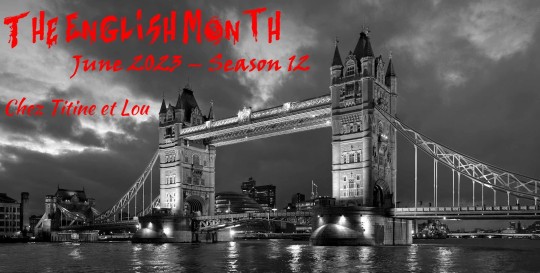
View On WordPress
0 notes
Photo
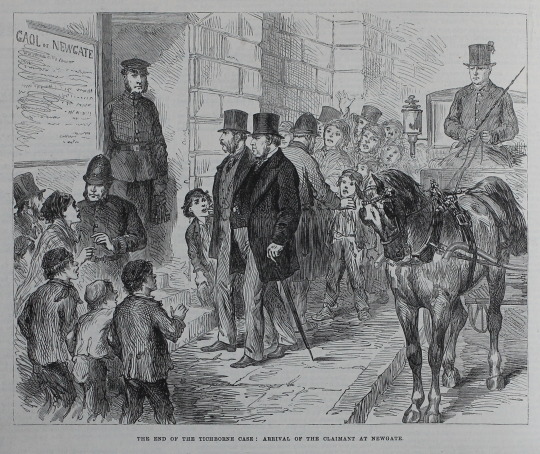
The Illustrated London News
Saturday, March 16, 1872.
Page 260
The end of the Tichborne case: arrival of the claimant at Newgate.
0 notes
Photo

Character Actor
Robert Middleton (born Samuel G. Messer, May 13, 1911 – June 14, 1977) Film and television actor known for his large size, beetle-like brows, and a deep, booming voice (for which he was known as "Big Bob Middleton"), usually in the portrayal of ruthless villains.
Middleton appeared in many television programs in the 1950s and 1960s, including the CBS anthology series Appointment with Adventure. He played a dishonest candidate for the United States House of Representatives in an episode of ABC's The Real McCoys, starring Walter Brennan and Richard Crenna. In the story line, Middleton falsely claimed to have previously been a farmer in a bid for the farm vote. Middleton was cast as "The Tichborne Claimant" in the NBC anthology series The Joseph Cotten Show.
In 1956, he guest starred on James Arness’s TV Western series Gunsmoke, playing the title character in the episode “Dutch George” (S1E32), a flamboyant career horse thief who was friends with Matt Dillon in their wilder younger days (this episode unveiled some of Dillon’s shadier past, once being a young man who also might have stolen, who at a yet to be revealed crossroad in life, opted to be a lawman). In 1961, he was cast as Arthur Sutro in the episode "The Road to Jericho" of the ABC western series, The Rebel, starring Nick Adams, and guest-starred in the episode "A Man of Means" of the short-lived crime adventure-drama series The Investigators, starring James Franciscus and James Philbrook
In 1958, Middleton was cast in the episode "Ambush in Laredo" as Frank Davis, who attempts in Laredo, Texas, to merge five outlaw gangs into one, in the ABC Walt Disney miniseries Texas John Slaughter, with Tom Tryon in the title role.
Middleton was cast in ten episodes of the ABC family western drama, The Monroes, with costars Michael Anderson, Jr., and Barbara Hershey. In 1963 he portrayed Josh Green in the episode "Incident of the Mountain Man" on CBS's Rawhide.
Among his several appearances in the long-running Alfred Hitchcock Presents, he portrayed a gangster in high places, Mr. Koster, in the 1956 episode "The Better Bargain". In 1958, he played the villain in the first episode of NBC's Bat Masterson western series, starring Gene Barry in the title role. He appeared in four episodes of The Untouchables, including the 2 part episode, "The Unhired Assassin", as Chicago mayor Anton Cermak. In 1961, he appeared in the episode "Accidental Tourist" on the James Whitmore ABC legal drama The Law and Mr. Jones. That same year, he portrayed the highly sympathetic but fiercely dedicated state executioner in an episode of Thriller (U.S. TV series) entitled "Guillotine". He also appeared in three episodes of Bonanza from 1960 to 1967. Middleton appeared as defendant "Judge Daniel Redmond" in the 1963 Perry Mason episode, "The Case of the Witless Witness". Middleton guest-starred on Get Smart as the KAOS villain "The Whip", intent on hypnotizing Agent 86 in the 1970 series finale "I Am Curiously Yellow".
4 notes
·
View notes
Text
I'm looking forward to reading Zadie Smith's new novel. The Tichborne case is interesting all on its own, I'm pretty psyched to have her get into it
#tbh I haven't really found her previous books that compelling#but I'm not the biggest reader of novels to be fair
5 notes
·
View notes
Text
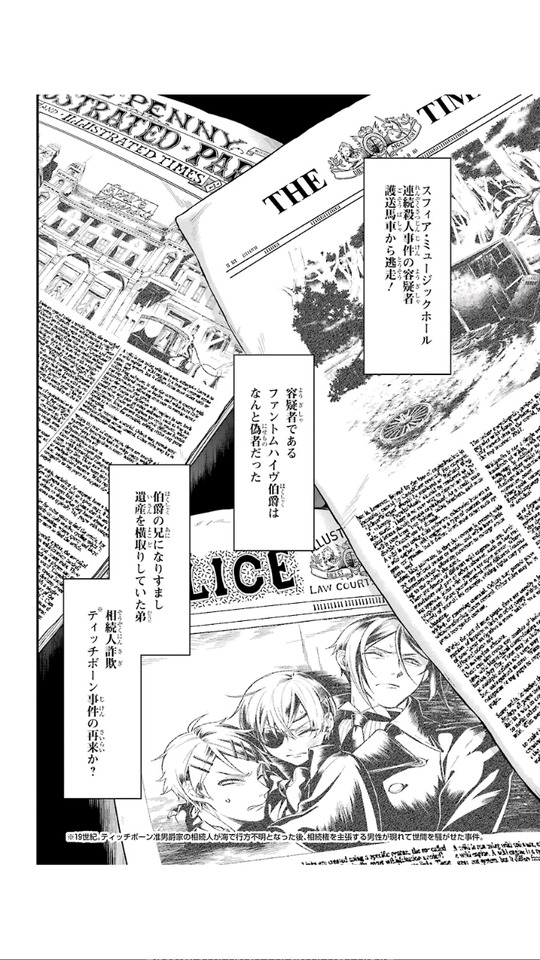

Our Ciel on the head line. Accused for serial murder and faking identity stealing his brother's heritage. It was referred to as "the Tichborne case again?"
Our Ciel: They made it more of a fuss than I've thought. (And Pitt already sold my photo...)
Lau: Why not just rush into the manor and eliminate your brother?
296 notes
·
View notes
Text
The Tichborne Case
The newspaper that reports about our Ciel’s ‘crime’ compares this case to the so called Tichborne Case:
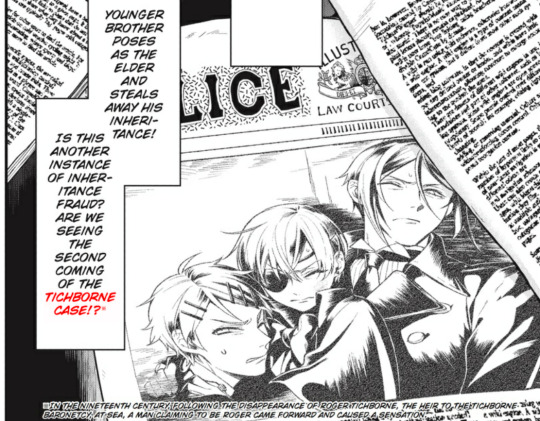
It’s already roughly explained as a side note in the chapter but here’s some more information on that:
The Tichborne Case is something which really happened in Victorian England during the 1860s and 1870s. In 1854, Roger Tichborne, heir to a wealthy Hampshire family, vanished on one of his travels. It’s said that he was on a ship that had sunk off the Brazilian Coast with no survivors. But there were rumors that another boat had picked up survivors and taken them to Australia, so Roger Tichborne’s mother refused to believe that her son was dead and searched for him through advertisements in newspapers around the world and offering rewards for information on her missing son.
In 1866, an Australian butcher claimed to be Roger Tichborne. Even though his appearance had quite changed, Lady Tichborne instantly accepted the claim and welcomed him as her lost son. Several other members of the Tichborne family, however, doubted him and after Lady Tichborne’s death in 1868 a trial began over the man’s identity.
The trial gained much attention since there were many supporters on each side and it took much time and money because witnesses were being searched in South America and in Australia who could identify the man. During the investigations details emerged supporting that the true identity of the man was not Roger Tichborne but Arthur Orton, son of an English ship victualler who had traveled to Australia.
In 1874 a court decided that the man was not Roger Tichborne and he was sentenced to 14 years for perjury.
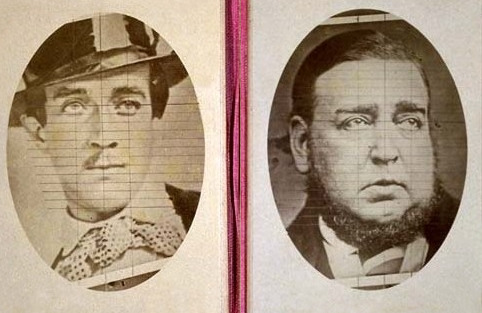
(left: Roger Tichborne (1853); right: Arthur Orton, claiming to be Roger (1874))
(sources and more information: x, x)
#I love how such details from what really happened are used in the manga#chapter 150 analysis#small details#black butler#kuroshitsuji
156 notes
·
View notes
Text
Kuro 150 Summary & Thoughts
その執事、魅了
That Butler, Mesmerising
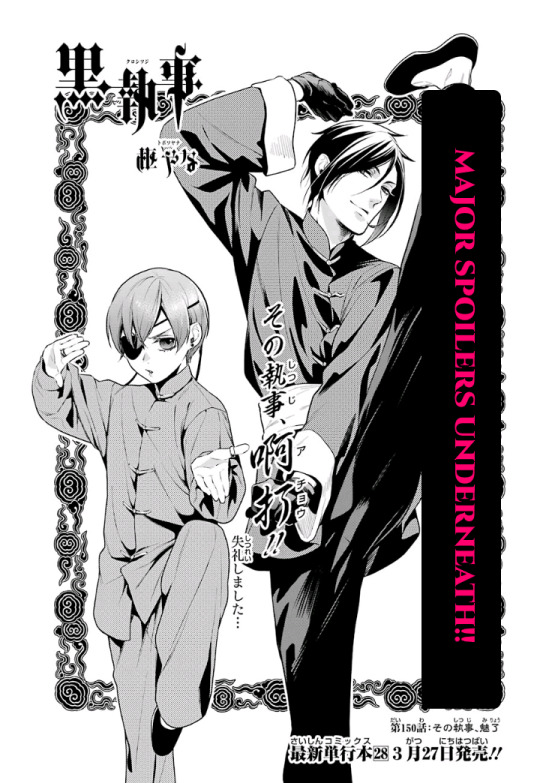
The previous chapter (149) gave us a glimpse of the laws and inner workings of Cinematic Records of the Kuroshitsuji universe, as well as the limits to Undertaker’s greatest project so far, Real!Ciel.
After two chapters, we are finally back with our protagonists in chapter 150.
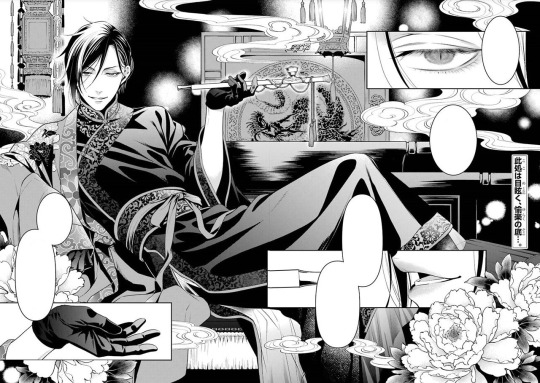
With the thick smokes of opium coiling around us, we find ourselves in Lau’s opium den once again. Welcoming us is Sebastian, a demon posing as an English man, working as a French girl for Lau. He has laid himself gorgeously on the couch, donning a Chinese garment – that unlike the previous one – does look like it is customised for his exceptional height (and thicc behind).
“Welcome, madam. Please come forward. Take but one whiff from my khsier, and you shall forget unforgiving reality. Now, surrender yourself to me……”
Sebastian speaks in a voice dangerously tender (judging by the font used).
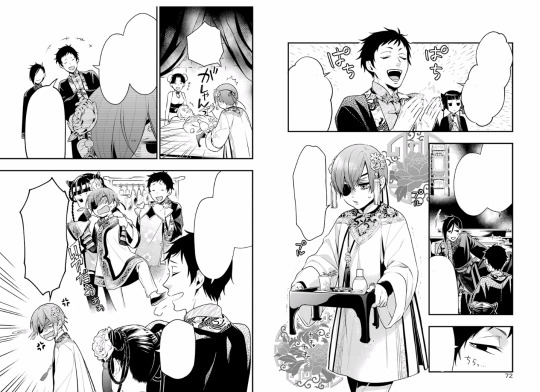
Lau applauds, calling Sebastian a professional at turning people to sin and depravity, and points out he might be better suited for his current assigned job at the den than being butler. Sebastian does not seem very impressed, and assures Lau he merely is one hell of a butler – nothing more and nothing less.
Despite Lau’s obvious contentment with the performance of the butler, Our!Ciel on the other hand seems to be struggling more to win the Chinese man’s approval. We see the boy struggling and failing to serve a plate holding a customer’s order (as expected, the only type of order this child can serve is his usual ‘meirei da’).
Lau makes it abundantly clear that there is no such thing as a free lunch, which is why he made the boy work at his den as a formality despite “the Earl’s clear lack of quality except being cute”.
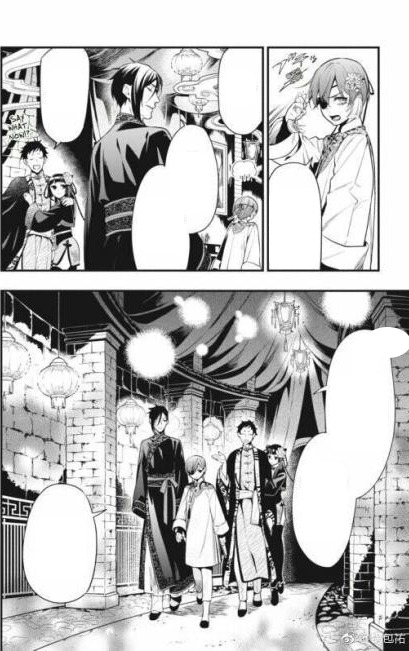
The casual beginning of the chapter serves as a warming-up before the story retakes its more serious tone and sets us back on track for the main plot. Despite Lau’s mockery, the man seems aware of what is at stake. Our!Ciel seems not bothered by his lack of ‘competence’ at his new job as he fully intends to get out form hiding in the cave as soon as possible. Lau seconds, agreeing that as long as the boy does not manage to get his previous title and privileges back, doing business for Lau too would prove to be hard. (Hmm, it sure is nice to have your powerful underground friends to actually stay powerful).
Our!Ciel holds the latest newspaper in his hands with the photograph taken by Pitt adorning its front page. He grows increasingly disturbed by the sheer slander reported as the truth, as well as the speed at which his former ally had sold the photo for cash.
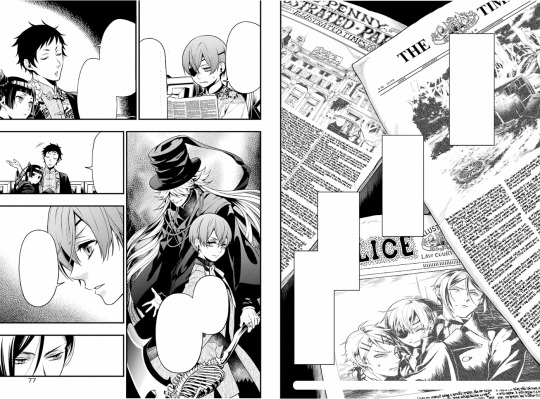
“Main suspect of the Sphere Music Hall’s serial murder case escaped from the coach!”
“The suspect Earl Phantomhive turns out to be an impostor”
“The younger brother who posed as the older brother to filch the heirloom from the rightful Earl. Inheritance Fraud case – The Tichborne Case revisited?
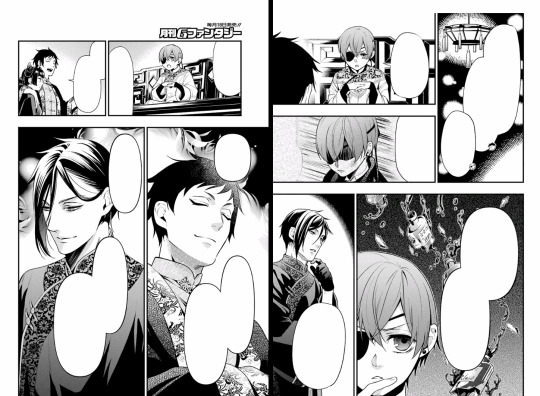
Lau takes notice of Our!Ciel’s distress and suggests him to take back the manor and neutralise Real!Ciel at top speed. “With the butler’s talents, a task such as this would prove to be no difficulty,” Lau attempts to assure Ciel.
Little did Lau know just how much of a threat Real!Ciel and Undertaker are to even Sebastian in full combat mode. Without disclosing too much information, Our!Ciel explains that his brother had already employed an exceptionally powerful private soldier, and therewith put a spoke in his wheel. Lau inquires what Our!Ciel proposes to do instead. The boy then reveals the concern he has had for a long time, namely the casualness with which the Sphere Music Hall had been forced to a close-down based on charges of murder as a cult organisation. He surmises that it is highly unlikely that the Music Hall is the only place where blood is being collected if his opponent’s plan is reliant on a continued blood supply.
Without further ado, Real!Ciel resumes his role as ‘Earl Ciel Phantomhive’ and gives immediate instructions in preparation for counter-attack. Lau is assigned to investigate whether cases of mass human trafficking and missing persons have taken place in the underground world. Sebastian in turn, is ordered to collect data on news on new trends and facilities in the underground society that may have ‘roused collective action from large crowds’. With both Sebastian and Lau having spoken the infamous line of assent “Yes, my Lord” this chapter ends.
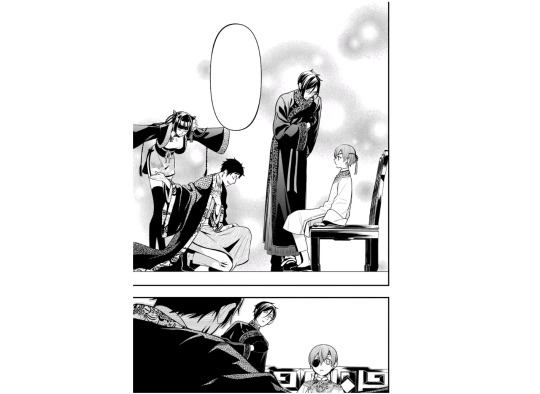
I think that this chapter is something many of us have been waiting for. FINALLY we see Sebastian in a robe that is not too small and throwing us an occasional bone for being such patient and well-behaved readers. My eyes and ovaries have finally been satisfied.
Okay, okay, just kidding.
The thing we have been waiting for: of course the previous two chapters were important and each serve their very important roles in the narrative, but it would be a lie to say I did not miss our favourite protagonists and finally see Our!Ciel kick back into action after more than a year of… basically nothing.
The last chapter (147) wherein we saw Our!Ciel was satisfying if not extremely cathartic, yes. But after a long period of flashbacks and dumbfound-Our!Ciel standing at the Phantomhive main staircase, we all were probably very ready for a change of pace. In chapter 147, our precious Ciel declared war on his brother, but left us wondering for two more chapters how exactly this ‘war’ would shape itself. Now finally in chapter 150, we get confirmation that while having remained entirely speechless for multiple chapters, Our!Ciel’s brain never stopped spinning. Whatever the plan is that his precious boy is cooking up, I am looking forward to it.
The following chapters will surely be very promising. Perhaps it is merely my sky-high expectations talking, but I honestly hope to see some stealth and undercover work performed by both Sebastian and Lau. It is most likely that they would each focus on their own respective jobs, but it would be most thrilling to see these two geniuses combine their geniusness for some genius strategies. Both Our!Ciel and Sebastian’s faces are now known by the public thanks to a certain unfaithful individual – ughum Pitt ughum. While disguises can work their magic, the Phantomhive duo is not exactly inconspicuous; a one-eyed boy, short and slender, and an exceptionally tall man as pale as a ghost. Perhaps Yana will do nothing with these limitations to her protagonists’ appearances, perhaps she will. But eitherway, it is certain that Our!Ciel and Sebas would have to employ whatever stealth they have up their sleeves from now on.
Until chapter 151, ‘That Butler, Ninja!!’
#Kuroshitsuji#Black Butler#kuroshitsuji spoilers#Kuroshitsuji 150#kuroshitsuji chapter 150#Chapter 150#thoughts and summary#chapter analysis#sebastian michaelis#o!ciel#R!ciel#undertaker#No I don't have the English Chapter don't ask.
114 notes
·
View notes
Text
0 notes